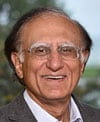
Thought Leadership
Trust Over Transactions: Building Customer Relationships for the Long Term
The conventional method for motivating sales teams hasn’t changed much over the years: pay bonuses based on sales, and try to rack up as many of those as your team can bring in. But is that really the best way to turn a profit?
According to Sanjay Khosla, Senior Fellow and Adjunct Professor of Marketing and co-Academic Director of Kellogg Executive Education’s Delivering Business Growth program, the crisis brought about by the pandemic provided a real-life experiment. And the answer was rather surprising.
Khosla was called in to work with a business-to-business company in the enterprise-solutions space. Their initial challenge was dealing with customer service teams and systems that couldn’t keep up with the company’s sales volume, which meant customers were complaining. Then the pandemic added a new level of difficulty because the company’s salespeople couldn’t call on customers in person.Among the key changes made to address those complications was the notion of building relationships rather than sales during the crisis. “The customer was dealing with a lot of issues due to COVID-19, so the company’s approach became one of trying to help them solve their problems rather than just making the sale,” Khosla said. “They began organizing virtual workshops with leading technical experts, getting on Zoom calls and bringing in people from universities, all without the hope of closing the deal. Instead, they established their credibility as someone who isn’t only in the relationship for the short term. The principle is that if you’re willing to give something, especially when the customer’s struggling, the customer will value it more. People appreciate it if you help them when they’re down.”
In addition, the company did something counterintuitive in order to deal with complaints about customer service: they dropped the less profitable customers in order to concentrate resources on the most profitable and keep them happy. It was a difficult decision, and it wasn’t easy to execute. A team consisting of the company CEO and the heads of sales and customer service had to tell those customers they’d no longer be working with them.
However, the result was worth it. As a result of those changes, the company’s revenues more than doubled and the quality of the sales rose, even as the number of customers dropped.
That falls under a process of examining how a company might improve its external efforts rather than simply forcing internal changes, Khosla said. “It’s looking out the window rather than in the mirror,” he said. “You focus on your customers, not on how you run your operation.”
That said, internal changes were instituted in order to build trust over transactions, too. An important one was to stop giving bonuses only to salespeople who made numbers and distribute the rewards to all involved when a goal was met. “Everyone got the same bonus,” Khosla said. “If you made the numbers, the whole team got it.” In addition, a huge investment was made internally in systems designed to improve the customer experience.
All in all, putting relationships and loyalty ahead of short-term targets makes for a long-term sustainable improvement in business, Khosla stressed. “Build the expertise and make sure the customer experience is excellent, and you’ll get the sale,” he said. “It’s all about building trust.”
 |
Sanjay Khosla is a Senior Fellow at Northwestern University's Kellogg School of Management and a Senior Advisor at Boston Consulting Group. He teaches in a variety of Kellogg Executive Education programs, including Delivering Business Growth and Kellogg on Branding. He is the co-author of Fewer, Bigger, Bolder with his colleague Mohan Sawhney. |
Download a Brochure >
Spaces are limited. Register today.
Delivering Business Growth
Emphasizing action, this program teaches a market-tested framework that has delivered sustained double-digit growth in revenues and margins for major global brands. You’ll leave with a business growth strategy and actionable agenda for driving growth within your organization.
Upcoming Sessions
|
June 2-5, 2025 Start: June 2 at 1:00 PM End: June 5 at 11:45 AM
Click here for Executive Education's COVID-19 health and safety protocols |
$9,000 Fee includes lodging and most meals |
|
|
October 27-30, 2025 Start: October 27 at 1:00 PM End: October 30 at 11:45 AM
Click here for Executive Education's COVID-19 health and safety protocols |
$9,000 Fee includes lodging and most meals |
Related Programs
Delivering Business GrowthRelated Articles
In a Crisis, Don’t Chase Shiny, Bright ObjectsLooking for a Growth Market? Think Deep, Not Broad
Planning High-Energy Meetings: The Cure for Zoom Fatigue
Three Ways to Avoid Becoming Too Complex
Unleash Your People's Potential with Blank Checks



